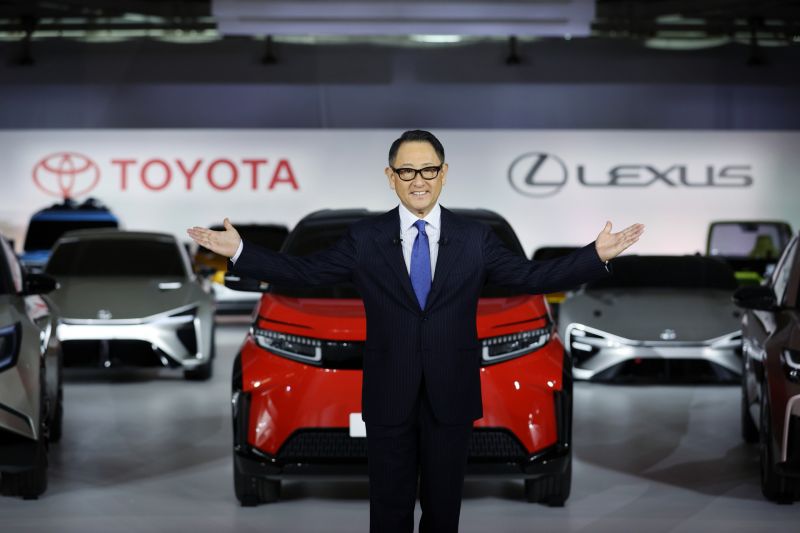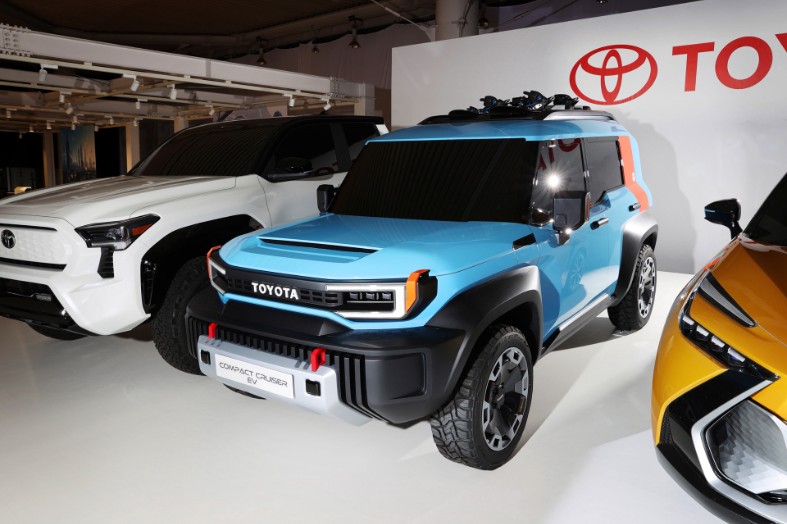Toyota Commits $35 Billion by 2030 to Develop New Electrified Vehicles, Including Hybrid & Fuel Cell Models
【Summary】Japan’s Toyota Motor Corp, which once saw hybrid vehicle powertrains as the future while the rest of the auto industry invested heavily in battery-powered vehicles (BEVs), is now going all in on electrification. But rather than producing only purely electric vehicles like Tesla, Toyota’s updated electrification plans through 2030 will include a mix of battery electric, hybrid and fuel cell powered vehicles.

Japan's Toyota Motor Corp, which once saw hybrid vehicle powertrains as the future while the rest of the auto industry invested heavily in battery-powered vehicles (BEVs), is now going all in on electrification. But rather than going all in on purely electric vehicles like other automakers, Toyota's updated electrification plans through 2030 will include a mix of purely electric, hybrid and fuel cell vehicles.
The automaker announced on Tuesday its revamped plans to rapidly electrify its model lineup. Those plans include a commitment to invest 8 trillion yen (US$70 billion) by 2030. Half of that amount would go towards the development new electrified models.
The updated plans are part of Toyota's long-term strategy of achieving carbon neutrality by 2050. Toyota President, Akio Toyoda, said that BEVs, which include fully-electric, hybrid and fuel cell vehicles, represent one of the most promising options to achieve that goal. But he warned that electrification alone is not enough to achieve Toyota's long term goals of becoming a carbon neutral company.
"If the energy that powers vehicles is not clean, the use of an electrified vehicle, no matter what type it might be, would not result in zero CO2 emissions," Toyoda said.
Toyota also aims to achieve carbon neutrality by 2035 at its manufacturing plants by continuously making steady improvements in reducing energy use and expanding the use of innovative production engineering technology, the company said.
Mr. Toyoda made his remarks at a media briefing the automaker held to share its electric vehicle strategies going forward. He stood on stage flanked by more than a dozen planned BEV Toyota models. He said there is no "one size fits all" solution in electrifying the company's model lineup, so the automaker will continue to develop hybrid and fuel cell models along with new purely electric vehicles.
To support its electrification plans, Toyota plans to invest $3.4 billion (2 trillion yen) in battery production by 2030, up from the 1.5 trillion yen it announced earlier. That investment includes $1.29 billion for a new U.S. battery plant in North Carolina that was announced last week.
The plant will start production in 2025 and expand operations by 2031. The factory will supply the batteries for Toyota's future U.S.-built electrified models.
Toyota is also developing internal combustion engines that run on hydrogen fuel. Mr. Toyoda said the technology could help to save some of Japan's 5.5 million auto jobs by allowing the automaker to keep its current powertrain supply chains that would otherwise disappear with a 100% shift to fully-electric cars.
Toyoda said he wants to prepare as many options as possible for customers around the world and believes that electrified vehicles can be divided into two categories, depending on how the energy that powers them is generated.
The first category is "carbon-reducing vehicles", which includes hybrid models. The other category of vehicles is "carbon-neutral vehicles", which are EVs that run on clean energy and achieve zero CO2 emissions in the whole process of their use.
Toyota's updated plans will allow its global customers to choose a vehicle that best meets their needs, rather than offering only fully electric models by 2030. By 2035, The automaker aims for battery EVs to be 100% of its global vehicles sales.
Toyota plans to introduce 30 fully-electric models by 2030 in both the passenger and commercial segments and is aiming for global sales of 3.5 million battery EVs per year by 2030.
"We want to leave all people with a choice, and rather than where or what we will focus on, we will wait a little longer until we understand where the market is going," Toyoda said.

Toyota's new EVs include an electric adventure vehicle called the "Compact Cruiser" that may help the automaker compete with Rivian.
Toyota's luxury brand Lexus however, will have a full lineup of battery-powered models in all vehicle segments by 2030 and to have EVs account for 100% of its vehicle sales in Europe, North America, and China. Toyota is targeting sales totaling 1 million units globally.
"We believe that the Battery EV will become the future symbol of Lexus as a model that most clearly expresses the evolution of the automobile brought about by electrification," said Koji Sato, President, Lexus International, Chief Branding Officer.
Toyota's massive investments in electrification come as electric automaker Tesla rose to become the world's most valuable car company in 2021, with a market cap topping $1 trillion in October. Toyota's market cap is currently just under $295 billion respectively.
But Tesla's rise building only fully electric vehicles has prompted legacy automakers like Toyota, General Motors and Volkswagen to commit billions to develop new models to compete in a changing auto industry that's quickly moving towards electrification.
With Toyota's plan however, the automaker is not abandoning hybrid and fuel cell vehicles just yet. These new vehicles will replace Toyota's internal combustion engine models gradually as the company moves towards its goal of carbon neutrality.
Toyota was the first to offer a hybrid vehicle when the company launched the Prius in 1997. At the time, it was the world's first mass-produced hybrid electric vehicle.
-


Ford is Testing a New Robotic Charging Station to Assist Drivers of EVs With Disabilities
-


Ford Raises the Prices of the F-150 Lightning Electric Pickup Due to Rising Raw Material Costs
-


The BMW 7-Series to Feature HD Live Maps From HERE Technologies for Hands-Free Highway Driving in North America at Speeds up to 80 MPH
-


AutoX to Use the 'Eyeonic Vision Sensor' from California-based SiLC Technologies for its Robotaxi Fleet in China
-


LG Develops ‘Invisible’ Speaker Sound Technology That Could Revolutionize In-Vehicle Audio
-


Researchers at South Korea’s Chung-Ang University Develop a ‘Meta-Reinforcement’ Machine Learning Algorithm for Traffic Lights to Improve Vehicle Throughput
-


Zeekr’s New 009 Electric Passenger Van is the World’s First EV to Feature CATL’s Advanced ‘Qilin’ Battery With a Range of 510 Miles
-


Redwood Materials is Building an Electric Vehicle Battery Recycling Facility in South Carolina
- Sony, Honda Sign Agreement for Joint EV Brand
- Audi Rebrands its Premium Car Rental Service to ‘Audi on demand’
- Facing Rising Production Costs, Automakers Ford, GM, Stellantis and Toyota Urge Congress to Lift the Cap on the $7,500 EV Tax Credit
- GM Expanding First Responder Training Program for EV Crashes
- GM to Invest $81 Million to Hand-Build Cadillac Celestiq in Michigan
- Honda's New EV Friendly Retail Plans Hint at the End of Mega Dealerships
- The Affordable New Smart Brand Electric Crossover Designed by Mercedes-Benz Officially Launches in China
- Tesla Vehicles Operating in Autopilot Mode Involved in 273 Crashes in Under a Year, the NHTSA Reports
- Volvo’s Parent Company Geely Launches a New Outdoor Lifestyle EV Brand Named 'RADAR'
- Ford Reportedly Dropping 2024 Mustang Hybrid











 About Us
About Us Contact Us
Contact Us Careers
Careers